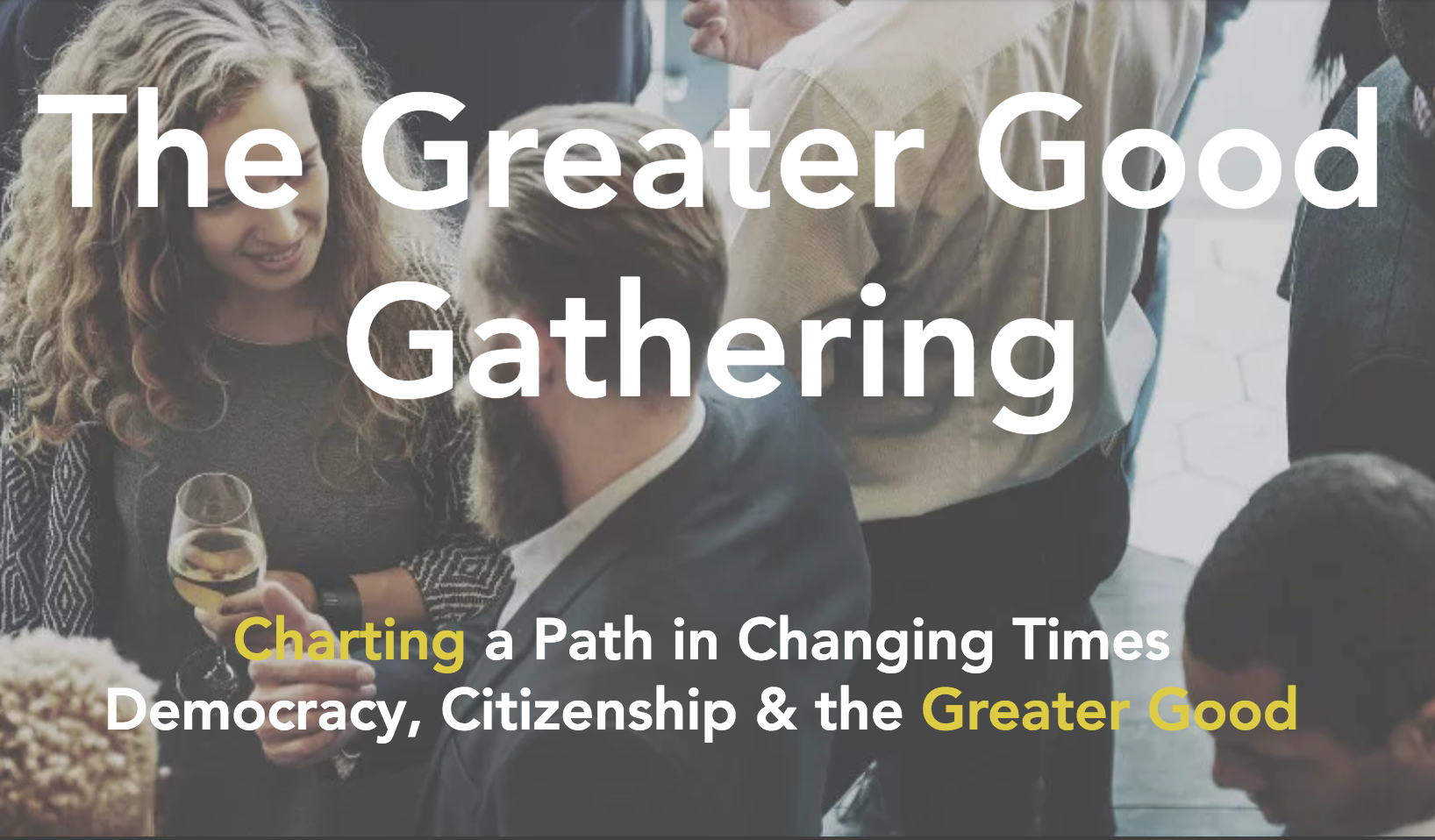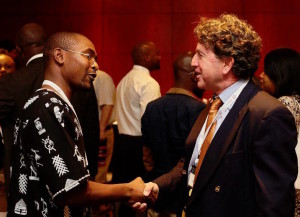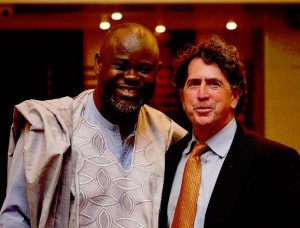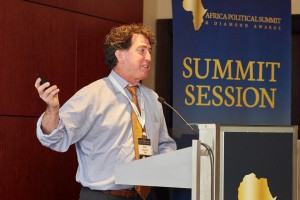Foreign Policy
Hurricane Donald
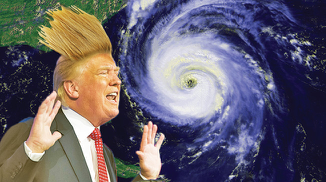 In the past month, I’ve written a trifecta of articles on a diverse set of issues in the news – the cultural divide within the country, international relations, Puerto Rico’s needs. But they all have one thing in common: the destructive nature of Donald Trump. Here are the highlights – but first a reminder:
In the past month, I’ve written a trifecta of articles on a diverse set of issues in the news – the cultural divide within the country, international relations, Puerto Rico’s needs. But they all have one thing in common: the destructive nature of Donald Trump. Here are the highlights – but first a reminder:
Check out the incredible line up of Speakers and register TODAY! Space is limited.
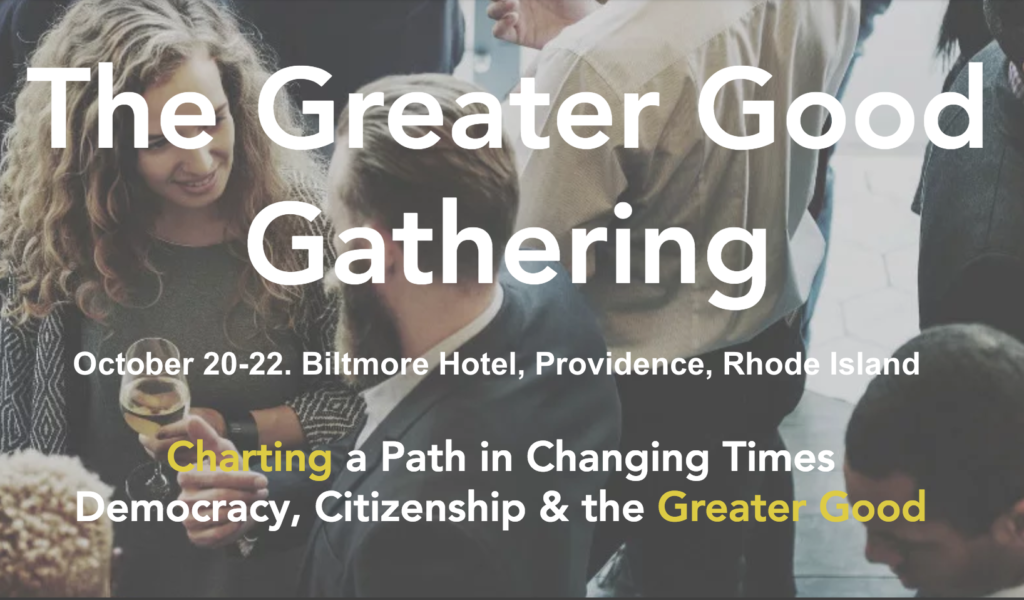
Let’s start with Puerto Rico, which I wrote about this week in US News & World Report. I’ve spent a lot of time in Puerto Rico in the last several years, working on the Commonwealth’s fiscal situation and economy. Puerto Rico offers – as did New Orleans, in the wake of Hurricane Katrina – an unusual opportunity for creative solutions, some of which I discuss in this article.
These will require resources. Yet Trump uttered “jaw-dropping comments in Puerto Rico itself” like, “It’s a great trip. Your weather is second to none,” while complaining that “You’ve thrown our budget a little out of whack.” The headline on the piece, Trump’s Past, Puerto Rico’s Future, doesn’t quite lay on the irony as thickly as I’d intended, but here’s the main argument:
How did Trump recover from the unmitigated disaster of his own financial choices? By declaring bankruptcy, refusing to pay his bills and restructuring in ways that left him an income and everyone else with the debts. Instead of railing against the Puerto Ricans for their failure to pull themselves up by their own bootstraps, in this instance Trump for once actually could profitably offer his preferred example for everything: himself.
… Puerto Rico needs a fresh chance to restructure operations, escape its debt, obtain massive new infusions of cash, and rebrand itself as a leader. And it needs all the rest of us to be complicit in that. Just as Donald Trump did.
This begins to get at the point that Trump’s personal brand of dysfunctionality both epitomizes and drives virtually all the spiraling challenges facing the country today. The State of Nation-States is a somewhat academic piece tackling “a point Trump made in passing” in his speech to the United Nations: “that, as he put it, ‘the nation-state remains the best vehicle for elevating the human condition.’” This proposition is debatable because the original impetus for the nation-state “was to reduce violence at the international level … while giving nation-states explicit and unlimited control over violence within their borders – not simply policing against violence but wielding it against their own citizens however they see fit.” Until a year or so ago, most Americans and Europeans would have agreed with “circumscrib[ing] the rights of nations to do whatever they want to the peoples within their borders” – i.e., “human rights” – but global changes are making many more sympathetic to authoritarian regimes.
The new virtual economy leapfrogs borders and generates changes that are leaving many behind economically and undermining aspects of their lives that they until now have taken for granted. For those less globally connected, the threats – physical, cultural, religious and economic (as well as cosmopolites who don’t seem to mind all those) – all seem associated with territoriality. The traditional nation-state therefore appears to be their bulwark, forging an odd, new coalition between traditionalists in cutting-edge economies and repressive states with extractive economies – personified in the rise of Donald Trump.
That takes me to the piece I grappled with for weeks and rewrote multiple times in the wake of the violence in Charlottesville and Trump’s kulturkampf reaction to it – The Rise of Zero-Sum Politics – which concluded:
For all the Hitler comparisons, Trump is really more reminiscent of Mao: Besides seething resentment and authoritarianism, Mao’s most notable personality trait was a constant need to throw everything around him into chaos. Having fractured the Republican Party into its constituent parts and driven a wedge between them, Trump, with his unerring sense for disruption, now has embraced the opposition.
I ended with a perhaps implausible prediction: Eventually, “Trump will endorse some form of single-payer health care plan” – not because he supports the idea (he obviously has no clue on health policy), but rather because “it would wipe Obamacare off the books” and “rupture the Democrats as badly as he has already his own party.” We’ll see if I’m right.
As usual, I welcome your comments below!
Of Good … and Evil
It was an unusually busy August! I’d like to update you on a few goings-on – most importantly, the Greater Good Gathering that I described in my last update. This is the first annual “Greater Good” conference, Democracy, Citizenship, and the Greater Good: Charting a Path in Changing Times, part of a larger, long-term effort aimed at the future.
The Gathering is now set for October 20-22 (Friday evening through Sunday lunchtime) in Providence, Rhode Island. We are in the process of finalizing the program, with a fantastic lineup of speakers already confirmed, and other panelists we are waiting to confirm. Most importantly, the Greater Good Gathering official website is now live, where you can stay up-to-date on the program, register and book your hotel rooms at the historic Biltmore Hotel, Providence, Rhode Island, where the Gathering will be held.
As you’ll see, confirmed speakers already include a former governor, a law professor on cybersecurity advising the World Intellectual Property Organization, a nationally-recognized communications expert, award-winning advocates for their work addressing human trafficking, the CEO of a major health care reform organization, the author of the nation’s first “Medicaid-For-All” legislation, the first woman and youngest person ever to lead a major AFL-CIO labor federation, one of Foreign Policy Magazine’s Top 100 Global Thinkers, and the co-founder of the Boston Mayor’s Office of New Urban Mechanics – among others.
We’ll be discussing:
-Public Sector Innovation: Can Government Be Saved?
-Defending Democracy & The Future of the Public Good
-Technology and Power: A History of the Future
-Up and Coming Innovators
-Public Good Beyond the Public Sector
-Application & Illustration: Health Care
There will also be plenty of time for networking and mentoring. Conference registration includes a welcome dinner, and healthy full breakfasts and lunches, at the Biltmore Hotel. Space is limited, so please register today.
Meanwhile, in the last month, our country has been fraying in ways unseen since the civil rights and Vietnam War era. As I wrote a few weeks ago in Government Untethered: “Some people find frightening the notion that countries as we know them – including our own – are on the verge of splitting apart. Others find it crazy. Scrolling through my news feed on a single, representative day last week … I found it simply to be the new normal.” Concluding with the story of the Venezuelan opposition’s attempts to create essentially a parallel, virtual democracy in the face of an increasingly-authoritarian government, I asked whether, in the long term,
a government, and its army, [can] hold territory where it has lost large swaths of the population? As people increasingly find the means to unite and construct self-governing mechanisms outside of “government,” can they actually opt-out of governments that don’t represent them? That’s a proposition that Venezuelans will be testing in coming weeks…. This isn’t just esoteric futurism anymore: It’s the daily news.
But, despite the new-technology veneer, all of this has roots that go back to the very beginnings of human civilization. In The Age-Old Rural Conflict, I wrote about the famous story of Cain and Abel as allegory for the triumph of settled agriculture – the New Economy of its day – over pastoralism. Cain is then portrayed in the Bible as, not coincidentally, moving on from murdering his herdsman brother to founding a major city.
The Cain and Abel story reflects a particular incident – the transition to settled agriculture and, as a result, urbanism – in the long history of technological change killing off prior economic, and attendant cultural and religious, arrangements. Such transitions aren’t peaceful, and they haven’t ended. The resulting sense of threat and hostility can reach Biblical proportions.
I’m thinking about both Good and Evil more right now, as I’ll be teaching a new course about them – called “Deep Policy” – this winter at Union Theological Seminary. Instead of talking about what policies might best address the challenges we face in such areas as crime control, inequality, discrimination, repression, environmental destruction, or a host of others, the course will ask, What drives these challenges to begin with and what – if anything – can we do to prevent them? To do this, we will draw upon and attempt to synthesize a wide range of disciplines, from theology and philosophy to chaos and game theory, ethics to evolutionary biology, psychology to economics – and, of course, public policy. In short, we will take an interdisciplinary approach to how wrong occurs – and how to right it.
I’ll have more on these subjects – and a few other upcoming conferences I’m organizing – in future updates.
As always, I look forward to hearing from you in the comments below.
Quick Links:
Global Disruption
 I’m back at the writing – and back in the USA – after a trip to Paris to moderate two panels on the recent French elections: one on “A Whole New France and Whole New World – Politics in the Age of Populism,” with political consultants from France, the US, Russia and Turkey; the other, called “Under Fire: What Role Did the Media Play in Shaping Opinion?,” with leading French journalists.
I’m back at the writing – and back in the USA – after a trip to Paris to moderate two panels on the recent French elections: one on “A Whole New France and Whole New World – Politics in the Age of Populism,” with political consultants from France, the US, Russia and Turkey; the other, called “Under Fire: What Role Did the Media Play in Shaping Opinion?,” with leading French journalists.
While there, I was interviewed by the head of the French foreign correspondents’ association, Fabrice Pozzoli-Montenay, about my own take on France’s elections. This led to my piece published this morning in US News & World Report. Here’s the main argument:
 Most commentators, both in France and here in the US, have taken the results as an indication that the global anti-global movement has crested…. I think reports of the demise of global disruption are premature.
Most commentators, both in France and here in the US, have taken the results as an indication that the global anti-global movement has crested…. I think reports of the demise of global disruption are premature.
What will remain true regardless of who becomes France’s next president, however, is that the two parties that have traditionally dominated French politics have imploded[:] only one-quarter of voters sided with the two major parties combined.
The success of both Macron and Le Pen – whose “party” is actually more like a “movement” resembling Trump’s – casts into doubt not simply the viability of the two long-time major parties but, even more so, of parties generally: Political parties very well might be headed the way of newspapers, TV networks, record manufacturers, hotels, cab companies and countless other “authorities” and industry incumbents that were undermined or rendered obsolete by new technologies that make it possible to unbundle services, democratize their provision, and allow consumers to assemble their own personal bundles. Just as people are increasingly their very own news sources – both as consumers and producers – so, pretty soon, might everyone be able more-or-less to form their own platform and political party, or at least a party of one, that can merge with or secede from others at will….
The US political system – with its “first past the post” allocation of offices – militates against party fragmentation, let alone such “micro-parties,” and in favor of a stable two-party system, in a way that Continental parliamentary systems do not. Otherwise, does anyone doubt that Americans already would be deserting both the Democratic and Republican parties in droves? But such grassroots unrest is something that both parties are already experiencing, with little idea of how to address. [I]t very well may be … that the aggregating and mediating function of parties is just another casualty of the atomizing and polarizing force of the new technologies on society as we have known it.

Scenes from Paris (clockwise): Moderating panel with French journalists, with French Senator Leila Aichi, at the French Senate, at Place de la Republique the morning of the poll.
Meanwhile, President Donald Trump passed the 100-day milestone in his presidency. I was asked by Aspenia to comment on this from the perspective technology and the economy. The piece explores themes I’ve address repeatedly in the past year or so concerning the rising global disenchantment with the kinds of economic and social disruptions caused by the new digital economy – disenchantment that has led to the rise of Trump, Le Pen and other right-wing populist/nationalist politicians worldwide. But I believe this is only the opening phase of a larger political realignment:
As it turns out, the information industry is just as extractive as prior economies: In an interesting little book, Platform Capitalism, the British Marxist economist Nick Srnicek observes that data turn out to be simply another natural resource that our newer technologies have figured out how to extract, and how to extract value from, not unlike mining, oil drilling or agriculture before them. Meanwhile, like manufacturing, these IT industries are focused on how best to increase per-worker productivity and substitute capital for labor whenever possible. In a few years’ time, the jobs being lost to technology will be not only those of former blue-collar manufacturing workers – they also will include those of many who now consider themselves riding the crest of the New Economy wave, from Uber drivers replaced by self-driving cars to radiologists replaced by AI to composers and authors replaced by hit-producing bots. Many current Hillary voters will be joining the disgruntled Bernie and Trump supporters who see the Titans of Information as their threat.
Meanwhile, these Titans, despite their seemingly liberal politics, are proving little different from other Titans of Industry. They’re already finding common ground with the traditionally Republican wings of the Republican Congress and Trump Administration: They recently joined to repeal Obama-era prohibitions on reselling individuals’ online search histories – and just days ago the Administration unveiled its plan to eliminate Obama’s “net neutrality” rules, so that big players can further dominate the Internet. In the words of that noted political philosopher Peter Townsend: Meet the new boss. Same as the old boss.
Both the Disruption, and the Resistance, are just beginning.
You can read the full pieces here:
– Macron and Le Pen’s success in France casts doubt on political parties
– Thus Donald Trump joined the global conflict on technology
As always, I welcome your comments below!
Charles Adler Tonight

My piece in US News & World Report last week, The Age of “Who Cares?”, attracted the attention of a Canadian talk show, Charles Adler Tonight, which invited me on to discuss the article. In the course of a 15-minute interview, I talked with host Charles Adler about Syria, Donald Trump, racial animosity, international responsibility, and how they’re all interrelated:
“We’re quite fortunate in the US, and we’re quite fortunate in most of the western world, compared to huge swaths of humanity today. It’s just, things aren’t quite as good in a lot of ways as most of us would like it to be, and they’re certainly nowhere near as good for a large segment of the population in this country as they could be and should. I think they rightly feel that a lot of people don’t care about their problems, and it’s hard to get exercised about other people’s problems in that kind of environment.”
You can listen to the whole interview on your computer or smart phone.
Un-Conventional Wisdom
 It’s been quite a two weeks. A Turkish friend started IM’ing me from Istanbul as the coup attempt against President Erdogan broke out, and our text conversation continued in “real time” throughout that dramatic night and into the next few days.
It’s been quite a two weeks. A Turkish friend started IM’ing me from Istanbul as the coup attempt against President Erdogan broke out, and our text conversation continued in “real time” throughout that dramatic night and into the next few days.
The next week, the Democratic National Convention convened here in Philadelphia and quickly consumed all my time: One US Senator decided to make my house his own B&B and then insisted I stay out until 2 a.m. listening to his favorite band – and, in return, unexpectedly gave me floor credentials.
One of the final-night speakers contacted me out of the blue and asked me to redraft her prime-time speech on a few hours’ notice. I met with three 2018 gubernatorial candidates about policy, and ran into countless old friends from all over the country – it was a great time. Then the next day, I had the opportunity to meet with journalists from Pakistan and female political leaders from Afghanistan to discuss the convention and the upcoming elections. The results of all this are below: three new articles – on the Turkish coup (sorta), the current election, and its potential aftermath.
Yesterday’s piece in US News & World Report – The Other Half of America — synthesizing where I think things stand after Donald Trump’s stunning acceptance speech describing America in apocalyptic terms, has already produced a surprising number of insult-filled emails (not like it’s that hard, but you actually have to feel strongly enough about responding to go look up my email address – it’s not in the articles). More people than usual have already re-posted or re-tweeted it. So, it seems to have hit a nerve on both sides. This is becoming increasingly true, with emotions unusually high in this election – as I note in the article, a previous piece provoked a similar Twitter exchange: “When the tweet started with the words, ‘I never heard of u b4,’ I immediately knew this was the rare reader who wasn’t a member of my immediate family and that the exchange wasn’t going to end well.”
The main message of the piece, however, which seems to have gone by both the liberals who like it and the Trump supporters who loathe it, is that while the latter’s “positions may seem counter-factual,”
that’s not how it feels. As a result, they are embracing political and legal positions they once opposed and that liberals once advocated for others. To liberals, this looks like hypocrisy and disingenuousness. But the fact that this means that liberal institutions (and liberal concern) aren’t there for them only makes their anger worse.
My convention piece for Aspenia — A Major Political Realignment Amidst the Confusion —elaborates on this theme, starting with the observation that “Donald Trump has realized Richard Nixon’s vision of making [blue collar] voters the core of the Republican Party, the culmination of a process long in the works, and the party realignment will look something like today’s polling for years to come: a more upscale Democratic Party more libertarian and less inclined to Big Government solutions than in the past, and a Republican Party more solicitous of Big Government programs to help low-to moderate-income voters than the party’s traditional ‘conservatism’ would ever countenance.”
It then urges Hillary Clinton to be like Franklin Roosevelt and “reach[] out to disaffected working Americans with an agenda that speaks to their needs.” It concludes with a warning of the US breaking apart after this election – presaging the beginning of Trump’s warnings several days later that the election will be stolen from him – asserting that, “The main questions are whether this can be headed off now by the ‘newly ascendant’ crafting an agenda for the economically dislocated, as Democrats would have in the past – and, if not, if the resolution comes peacefully or not.” (I was also quoted this week in much the same vein in Governing magazine.)
My article on the Turkish coup — A Predictable Surprise in Turkey — is similarly somber. It begins and ends, “When the end of democracy came … everyone was surprised.” You can read into it what you want – but read it. While this all might sound rather depressing, I’ve actually been enjoying myself through it all. Hope you are, too.
As always, I welcome your comments below.
Brexit: The End of Democracy as We Know It
 Thanks to American Airlines delaying my Thursday evening flight home by 6 hours, I pulled an all-nighter and was able to follow the Brexit returns and morning-after impacts from London in real-time. I immediately dashed off a piece for US News. It went live this weekend. Given the history-in-the-making nature of this vote – and its impact on all the issues on which I write and teach – I wanted to share it with you right away.
Thanks to American Airlines delaying my Thursday evening flight home by 6 hours, I pulled an all-nighter and was able to follow the Brexit returns and morning-after impacts from London in real-time. I immediately dashed off a piece for US News. It went live this weekend. Given the history-in-the-making nature of this vote – and its impact on all the issues on which I write and teach – I wanted to share it with you right away.
Below is an expurgated version for quicker reading; to read the complete version, The End of Democracy as We Know It, click here.
Many observers are interpreting Britain’s vote to leave the European Union in much the same terms as Donald Trump. “Basically, they took back their country. That’s a great thing,” Trump said. In a written statement, he went on that the British “have voted to reassert control over their own politics, borders and economy.”
The British vote indeed may be a good leading indicator of where elections are headed in the U.S. later this year and in Europe the next – but what it indicates for the longer term is probably exactly the opposite of what these commentaries, and insurgents like Trump, Marine Le Pen in France, and the Brexiteers, represent.
Britain has taken the first step in tearing apart one of the world’s major transnational organizations. It’s clear that others will soon follow and that the “Leave” vote in Britain was driven by the same anti-globalization, anti-immigration anger that has swept over not only the whole of Europe but also our own country. So, at first blush, these would appear to be – as Trump and others have heralded it – the first waves of reasserting national sovereignty and the firmness of borders (not to mention border walls).
Think again. The waves are cracking and demolishing all walls, not building them up.
The immediate effects of the Brexit vote include not only calls for further nation-state exits from the EU, but also resurgent sub-national claims to exit from their nation-states. The Scots – who voted overwhelmingly to Remain – almost tore Britain apart two years ago and are now almost certain to do so by 2018. They are not alone.
In sum, the nationalist resurgence of 2016 is not the new normal. It is but a way station on the road to the larger crack-up.
The U.S. itself is not immune. That should be the clearest lesson of the U.K. vote. That vote was very segregated: London as well as Britain’s historically more European-oriented satellite states strongly supported the “Remain” position; other parts of the country – those not enjoying the benefits of global trade, finance and elite educations – overwhelmingly wanted to leave. The different tribes of Britain – defined now more by their opportunities and, thus, their, global connectedness than by historic ethnicities – are going their separate ways.
The same is true here. This country is deeply divided into two ideologically homogenous but wholly incompatible blocs. These blocs are also almost entirely geographically independent. Given the snarling animosities of this year’s campaign, it is highly likely that talk of actual separation will rise after November. Since Obama’s election, conservative enclaves and states have increasingly raised the specter of seceding; lefties – which increasingly means the globally-connected urban, coastal elite – increasingly will be willing to let them. As borders and territory everywhere come to matter less and less to the economic and political elite, but more and more to the Left Behind, it is unlikely that the U.S. will be spared this phenomenon.
That means not just the end of nations as we know them, but also of democracy as we know it. I don’t mean that I expect totalitarianism to wipe away democracies everywhere. Instead, the choices that matter will be those between such entities, not within them. People will “vote” with their feet, their markets or their clicks. The old science of politics will be a thing of the past.
The “End of History” is so over. This is the beginning of a whole new chapter.
As always, I welcome your comments below.
Going Global in 2016
Our futures are increasingly interwoven with developments beyond the borders of the US. So, my end-of-2015 contribution to U.S. News & World Report, Virtually Unstoppable, tied together several strands: the weakening of traditional nation-state structures in the west, the increasing virtuality of governance and thus of the threats faced by ordered societies, and the challenges this poses to liberal values and economic progress.
Now, that’s paired with my first piece of 2016 – The Global Tsunami at World’s End – that discusses my recent trip to South Africa (where I also spoke at the Africa Political Summit): what I heard and saw there, and how that relates to what we’re seeing worldwide, as well as here in the US, as to the increasing anger with economic and political elites.
My consulting work also has been taking me outside the US more and more – last March, Colombia to discuss improving governmental efficiency, and Mexico City
in November to speak with an international gathering about the role of policy issues in improving election campaigns and democracy worldwide. (The Mexican finance ministry also allowed me to interview its expert on crypto-currencies – on which Mexico is a potential leader – for a forthcoming piece in U.S. News.).
I’m already planning further consulting trips to West Africa, southern Africa, and South America in 2016.
As always, I look forward to your comments on my articles.
Checkmating Putin
 My piece this week in US News, “Checkmating Putin“, addresses the rising threat posed by Vladimir Putin and why I think that threat, while problematic, does not pose a long-term problem for US interests.
My piece this week in US News, “Checkmating Putin“, addresses the rising threat posed by Vladimir Putin and why I think that threat, while problematic, does not pose a long-term problem for US interests.
Today kicks off several days of speaking appearances for me. I’m giving a presentation this morning in Mexico City, at the 48th Annual World Conference of the International Association of Political Consultants on how policy and issues actually can make a difference in political campaigns. (As several people have reminded me, it will be a very short talk.) I’m on a panel with experts on African, Kyrgyz, and Turkish elections.
On Monday, I’m presenting to the West Virginia Legislature on my firm’s review of that state’s education system four years ago and what areas for improvement remain. Then I fly to DC to appear on a panel Tuesday morning on Capitol Hill to discuss the fiscal crisis in Puerto Rico and what can be done about it. After that, of course, I fly to Chicago for my weekly class at the Harris School of Public Policy at University of Chicago on “The Future of Government.”
Fortunately, I don’ have any further travel planned (other than my course at UChicago) for the remainder of the year. Yet.
The Liberal Case for Intervening in Syria and Iraq
A recent dinner conversation turned into a lengthy and heated debate about U.S. foreign policy that left me despairing for liberalism.
It all began innocuously enough. One of my dinner companions, whom I’ll call “Gary,” started by criticizing President Barack Obama’s decision to attacks the Islamic State group. I suppose I could have just let it pass completely, but I decided to demur on the narrow ground that I’m what used to be known as a “liberal interventionist.” This provoked an unexpectedly sweeping retort from Gary: “Name one country where American military intervention succeeded in making things better.”
Read the rest of this post in USNews.com


